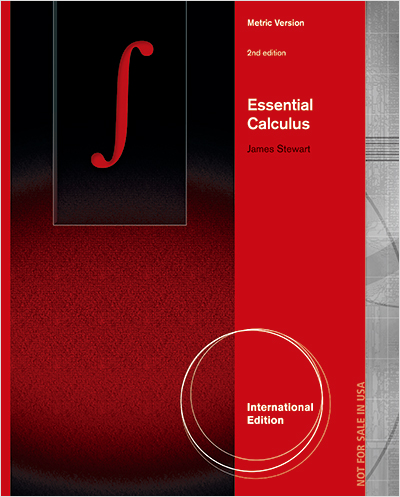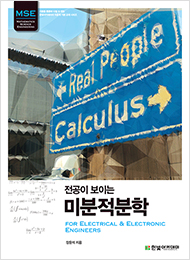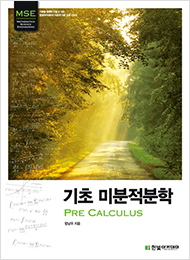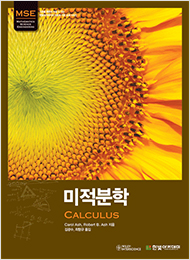[도서 장점(마케팅 포인트)]
- The text presents exponential, logarithmic, and inverse trigonometric functions late, with the logarithm defined as an integral. Instructors wishing to cover such functions earlier should consider ESSENTIAL CALCULUS: EARLY TRANSCENDENTALS, 2e, International Metric Edition.
- Each chapter ends with a comprehensive review that includes a true/false quiz, Concept Check Questions, and exercises for every topic covered in the chapter.
-
Tools for Enriching Calculus—a free, online, interactive resource that allows Calculus students to work with animations that deepen their understanding by helping them visualize the concepts they are learning—has been updated with new problems and a new Flash design that is more visually appealing and engaging. Written and narrated by James Stewart, these assignable animations are also integrated into Cengage YouBook, and many are available directly to students at www.stewartcalculus.com.
- For the convenience of instructors who wish to cover additional material, the www.stewartcalculus.com website contains: Review of Algebra, Trigonometry, Analytic Geometry, and Conic Sections; Additional Examples; Projects; Archived Problems (drill exercises from Stewart's other books) with solutions; Challenge Problems; Lies My Calculator and Computer Told Me, and more.
- Additional topics (with exercises) available at www.stewartcalculus.com include Principles of Problem Solving, Strategy for Integration, Strategy for Testing Series, Fourier Series, Area of a Surface of Revolution, Linear Differential Equations, Second Order Linear Differential Equations, Nonhomogeneous Linear Equations, Applications of Second Order Differential Equations, Using Series to Solve Differential Equations, Complex Numbers, and Rotation of Axes. Links to outside web resources and the History of Mathematics, with links to historical websites, are also available at the site.
- The text presents a concise approach to calculus for instructors who want to focus on essential principles and who feel no need for frills.
-
Brevity is achieved through condensed exposition, fewer examples in some sections, fewer technology and conceptual problems, and fewer appendixes. Problems Plus and Projects have been moved to the author's website at www.stewartcalculus.com.
- Certain topics, for example, the treatment of the integral and the remainder term in Taylor Series, are presented in a manner that is more traditional than in Stewart's other books.
[부/장별 내용 요약]
Diagnostic Tests
The book begins with four diagnostic tests, in Basic Algebra, Analytic Geometry, Functions, and Trigonometry.
CHAPTER 1. FUNCTIONS AND LIMITS
After a brief review of the basic functions, limits and continuity are introduced, including limits of trigonometric functions, limits involving infinity, and precise definitions.
CHAPTER 2. DERIVATIVES
The material on derivatives is covered in two sections in order to give students time to get used to the idea of a derivative as a function. The formulas for the derivatives of the sine and cosine functions are derived in the section on basic differentiation formulas. Exercises explore the meanings of derivatives in various contexts.
CHAPTER 3. APPLICATIONS OF DIFFERENTIATION
The basic facts concerning extreme values and shapes of curves are deduced from the Mean Value Theorem. The section on curve sketching includes a brief treatment of graphing with technology. The section on optimization problems contains a brief discussion of applications to business and economics.
CHAPTER 4. INTEGRALS
The area problem and the distance problem serve to motivate the definite integral, with sigma notation introduced as needed. (Full coverage of sigma notation is provided in Appendix B.) A quite general definition of the definite integral (with unequal subintervals) is given initially before regular partitions are employed. Emphasis is placed on explaining the meanings of integrals in various contexts and on estimating their values from graphs and tables.
CHAPTER 5. INVERSE FUNCTIONS
The logarithm is defined as an integral and exponential function as its inverse. Applications to exponential growth and decay follow. Inverse trigonometric functions and hyperbolic functions are also covered here. L’Hospital’s Rule is included in this chapter because limits of transcendental functions so often require it.
CHAPTER 6. TECHNIQUES OF INTEGRATION
All the standard methods are covered, as well as computer algebra systems, numerical methods, and improper integrals.
CHAPTER 7. APPLICATIONS OF INTEGRATION
General methods are emphasized. The goal is for students to be able to divide a quantity into small pieces, estimate with Riemann sums, and recognize the limit as an integral. The chapter concludes with an introduction to differential equations, including separable equations and direction fields.
CHAPTER 8. SERIES
The convergence tests have intuitive justifications as well as formal proofs. The emphasis is on Taylor series and polynomials and their applications to physics. Error estimates include those based on Taylor’s Formula (with Lagrange’s form of the remainder term) and those from graphing devices.
CHAPTER 9. PARAMETRIC EQUATIONS AND POLAR COORDINATES
This chapter introduces parametric and polar curves and applies the methods of calculus to them. A brief treatment of conic sections in polar coordinates prepares the way for Kepler’s Laws in Chapter 10.
CHAPTER 10. VECTORS AND THE GEOMETRY OF SPACE
In addition to the material on vectors, dot and cross products, lines, planes, and surfaces, this chapter covers vector valued functions, length and curvature of space curves, and velocity and acceleration along space curves, culminating in Kepler’s laws.
CHAPTER 11. PARTIAL DERIVATIVES
In view of the fact that many students have difficulty forming mental pictures of the concepts of this chapter, I’ve placed a special emphasis on graphics to elucidate such ideas as graphs, contour maps, directional derivatives, gradients, and Lagrange multipliers.
CHAPTER 12. MULTIPLE INTEGRALS
Cylindrical and spherical coordinates are introduced in the context of evaluating triple integrals.
CHAPTER 13. VECTOR CALCULUS
The similarities among the Fundamental Theorem for line integrals, Green’s Theorem, Stokes’ Theorem, and the Divergence Theorem are emphasized.




